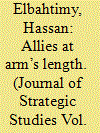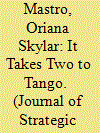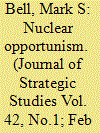| Srl | Item |
| 1 |
ID:
165094


|
|
|
|
|
| Summary/Abstract |
This article examines Egyptian–Soviet relations in the run up to the 1967 Arab–Israeli war. It argues that Egypt and the Soviet Union stumbled into brinkmanship with little coordination and no agreement on common objectives or goals. The article demonstrates how frustration and mutual disappointment were recurring features of the interactions between the two allies during the critical weeks prior to the war. In doing so, the article exposes new aspects of how Cairo and Moscow managed their alliance and assesses what that means to our understanding of the origins of this transformative war. These conclusions challenge revisionist accounts that attribute the start of the war to Egyptian–Soviet collusion and some traditional narratives that present the Soviet Union as an enterprising risk-taker invested in regional brinkmanship. The article draws heavily on Egyptian and Arabic language sources to examine Egyptian–Soviet interactions during this key period of Middle Eastern history.
|
|
|
|
|
|
|
|
|
|
|
|
|
|
|
|
| 2 |
ID:
165092


|
|
|
|
|
| Summary/Abstract |
The nuclear weapons taboo is considered one of the strongest norms in international politics. A prohibition against using nuclear weapons has seemingly shaped state behavior for nearly seven decades and, according to some observers, made nuclear use ‘unthinkable’ today or in the future. Although scholars have shown that nuclear aversion has affected decision-making behavior, important questions about the nuclear taboo remain unanswered. This article seeks to answer a basic question: How durable is the taboo? We develop different predictions about norm durability depending on whether the taboo is based primarily on moral logic or strategic logic. We use the comparable case of the norm against strategic bombing in the 20th century to evaluate these hypotheses. The logic and evidence presented in this paper suggest that the norm of nuclear non-use is much more fragile than most analysts understand.
|
|
|
|
|
|
|
|
|
|
|
|
|
|
|
|
| 3 |
ID:
165093


|
|
|
|
|
| Summary/Abstract |
Why did the United States fail to stop Israeli acquisition of nuclear weapons? Existing research argues that patrons such as the U.S. should have an easy time halting proliferation by militarily and economically vulnerable clients. Nevertheless, Israel acquired nuclear weapons with relatively little American opposition. Utilizing extensive primary source research, we argue that problematic intelligence-policy relations hindered U.S. efforts to arrest Israeli proliferation as (1) policymakers often gave mixed guidance to the intelligence community, resulting in (2) limited information on Israeli efforts that reinforced policy ambiguity. The results carry implications for understanding the dynamics of nuclear proliferation and intelligence-policy relations.
|
|
|
|
|
|
|
|
|
|
|
|
|
|
|
|
| 4 |
ID:
165095


|
|
|
|
|
| Summary/Abstract |
What factors do autocracies evaluate when responding to perceived threats and why might they fail to balance appropriately? I posit that autocratic leaders may choose greater exposure to an external threat if, by doing so, it preserves regime legitimacy. Specifically, the desire to promote a positive image to one’s domestic public creates incentives to publicly downplay a rival’s military progress, which then affects the state’s ability to mobilize resources to respond to the growing threat. I test this theory in the case of China’s response to India’s military rise. This research contributes to balancing theory and empirical work on East Asian security.
|
|
|
|
|
|
|
|
|
|
|
|
|
|
|
|
| 5 |
ID:
165091


|
|
|
|
|
| Summary/Abstract |
How do states use nuclear weapons to achieve their goals in international politics? Nuclear weapons can influence state decisions about a range of strategic choices relating to military aggression, the scope of foreign policy objectives, and relations with allies. The article offers a theory to explain why emerging nuclear powers use nuclear weapons to facilitate different foreign policies: becoming more or less aggressive; providing additional support to allies or proxies, seeking independence from allies; or expanding the state’s goals in international politics. I argue that a state’s choices depend on the presence of severe territorial threats or an ongoing war, the presence of allies that provide for the state’s security, and whether the state is increasing in relative power. The conclusion discusses implications of the argument for our understanding of nuclear weapons and the history of proliferation, and nonproliferation policy today.
|
|
|
|
|
|
|
|
|
|
|
|
|
|
|
|